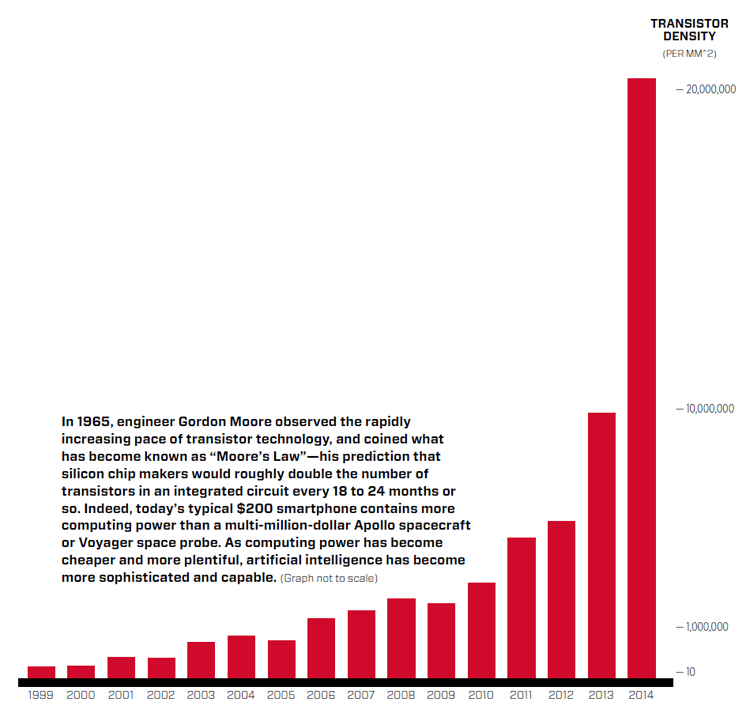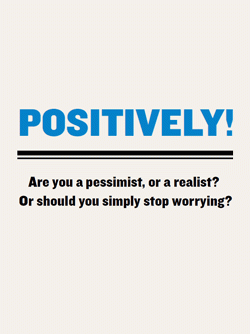Artificial Intelligence: Promise or Peril?
Will machine intelligence revolutionize human civilization—or bring it to the brink of destruction? What does the future portend for mankind?
Will science find a way to externalize and even surpass human intelligence through mechanical means, leading to ever-increasing prosperity and leisure? Or will scientific progress quickly lead to human doom?
When God made Adam and Eve, the first two human beings, He made them with great potential. Unlike all the other creatures of the world, only humans did He make in His own image (Genesis 1:26–27), gifting them with amazing talents, capabilities, intelligence and creativity.
Sadly, Adam and Eve in the Garden of Eden chose to rebel against their Creator. They chose to eat of the forbidden Tree of the Knowledge of Good and Evil. In doing so, they chose to decide for themselves what was right and what was wrong.
Ever since, each human being has followed in their footsteps, and the human experience has been just that: a mixture of right and wrong, good and evil. With seemingly every discovery or technological innovation, people have used their God-given intelligence to find ways to apply it for both good and evil—to help and to harm.
This paradox of human intelligence holds true even as mankind strives to understand intelligence itself. As human intelligence applies itself to the creation of artificial intelligence (often simply called "AI" for short), in one of the most advanced and ambitious fields of research human beings have ever pursued, what can we expect? Can we look forward to millennia of peace and prosperity under the care of benign and wise super-intelligent computers? Or will we continue the pattern of the last few thousand years, finding an evil use to match every good one? You may be surprised to learn that your Bible reveals the answer!
"Thinking" Machines
In the early and middle years of the 20th century, as mankind made strides in the brand new field of computer science, researchers began to wonder if they could create a machine with human-like intelligence—a mechanical brain to rival or even surpass biological brain-power.
Early work was promising, and computers were soon playing chess and checkers against human opponents. But the successes were short-lived, as scientists found that beyond simple pattern-matching as in a game of tic-tac-toe or chess, the mysteries of human intelligence and thinking were far too complicated to replicate directly in a computer program. The attempt to duplicate human intelligence—to make a computer emulate the unique human spirit that sets mankind apart from the animal world (Job 32:8)—has proved to be far more complex than was first imagined.
But there has been a renaissance in the realm of artificial intelligence in the 21st century, even as researchers have given up trying to model human intelligence and its approach to problem solving as a means of achieving artificial intelligence. Instead, they are harnessing the power of data processing and statistical probabilities. The result has been the creation of machines that not only take in vast amounts of data, but that also learn from the data, inferring connections among bits of information by finding patterns and relationships of cause and effect.
The consequence has been that, while machines do not yet replicate actual human thought processes, they can—in ways all their own—produce very "intelligent" results. This has led to such a wide range of technical and commercial advances that, if you live in the developed world, AI is probably not some abstract concept far distant from you. When you read your e-mail or use your car's navigation system or change the filter in your refrigerator—or in so many other ways—AI is probably already a part of your daily life!
Artificial Intelligence: Almost Inescapable
Consider that when you check your e-mail, your inbox is probably protected from the 70 percent of e-mail that is "spam"—junk mail we did not ask for—by artificial intelligence programs that sort through incoming mail to take the junk out.
Unimaginable just a few years ago, if you own a "smartphone" you probably have access to a weather app with a speech interface. Ask "What will the weather be like tomorrow?" and Apple's Siri or Microsoft's Cortana will give you an audible reply, such as "It doesn't look so good tomorrow. Down to 45°F and raining."
Robots are no longer reserved for science fiction movies; they are in the home. The American company iRobot has sold more than 10 million robots for personal use, including its popular "Roomba" which uses some very basic computerized algorithmic intelligence to vacuum your household floor.
If you have used a GPS to navigate in your car, purchased a book recommended to you by a vendor such as Amazon or Barnes & Noble, or watched a movie suggested to you by a Web site such as Netflix or Hulu, you have interacted with artificial intelligence!
Saving Lives and Solving Murders
Many television viewers were introduced to AI when an IBM computer named "Watson" competed on the popular knowledge-based game show Jeopardy! in January 2011. The computer defeated two opponents who had distinguished themselves among the show's most expert human champions. Despite the wealth of human knowledge it was up against, Watson displayed an extraordinary ability to understand and answer questions posed in natural human language, beyond what most viewers had ever before seen in a computer.
Watson's creators, however, had loftier hopes for the technology. The AI that won a game show is now being used to improve successful patient diagnosis rates in hospitals. Forbes magazine reported in 2013 that nurses who use Watson as a resource now take the AI program's advice 90 percent of the time.
And Watson is not alone in the field of life-saving artificial intelligence. Researchers at Stanford University have developed an AI system that within hours of a premature baby's birth can determine the child's risk of life-threatening complications. At the University of Tokyo, researchers are developing AI systems to identify subtle clues in swimmers' body movements to warn lifeguards when even one swimmer in a large crowd is about to drown.
AI systems are even being used to solve murders. In the Netherlands, an artificial intelligence system called Bonaparte solved a 13-year-old murder case by sifting through DNA evidence and familial connections to identify the killer, who later confessed to the crime.
Indeed, we are increasingly surrounded by artificial intelligence systems, which are having a say in larger and larger parts of our lives, making decisions for us—and about us—behind the scenes.
Can AI Be Controlled?
The growing role of AI has many concerned. As Douglas Heaven asked in a New Scientist article: "The danger is that we give up asking questions. Could we get so used to choices being made for us that we stop noticing? The stakes are higher now that intelligent machines are beginning to make inscrutable decisions about mortgage applications, medical diagnoses and even whether you are guilty of a crime" ("Not like us: Artificial minds we can't understand," August 2013).
Researchers are increasingly asking these questions based on the realization that modern artificial intelligence, unlike human intelligence, relies on the processing and comparison of vast amounts of data in volumes no human being could ever absorb. So, if an AI were to misidentify an innocent person as the perpetrator of a crime, would human beings even begin to have the capacity to find the flaw in its artificial "reasoning"? In a world where artificial intelligence is being used to make more and more complex decisions, this is an important question. Indeed, it is becoming a matter of life and death—potentially on a worldwide scale.
For instance, artificial intelligence is increasingly being considered a necessary ingredient on the battlefields of war. Many naval warships already carry Phalanx CIWS (Close-In Weapon Systems) that both identify and engage threatening targets—such as enemy drones or missiles—automatically, based on artificial intelligence programing. Similarly, unmanned planes are being programmed with autonomous decision-making ability, increasingly removed from the involvement of a human controller.
Some believe self-controlled, artificially intelligent robotic weapons systems—programmed to kill enemy combatants automatically without first seeking permission from a human being—will actually save lives, removing human soldiers from the frontlines of battle and operating with greater-than-human accuracy. As one former member of the Israeli Defense Force has argued, "If the goal of international humanitarian law is to reduce noncombatant suffering in wartime, then using sharpshooting robots would be more than appropriate, it would be a moral imperative… Battlefield robots might yet be a great advance for international humanitarian law" (Erik Schechter, Wall Street Journal, July 10, 2014).
And, as The Economist suggested, "Given the propensity for human error in such circumstances, mechanised grunts might make such calls better than flesh-and-blood officers. The day of the people's—or, rather, the robots'—army, then, may soon be at hand" ("No command, and control," November 25, 2010).
An "AI Apocalypse"?
Still others see more concern than promise. The international organization "Campaign to Stop Killer Robots"—which would have sounded comical and ludicrous only a few years ago—has focused since early 2013 on attempting to ban "lethal autonomous weapons systems" before they come into broad acceptance and use. As the organization declares on its Web site, "Giving machines the power to decide who lives and dies on the battlefield is an unacceptable application of technology. Human control of any combat robot is essential to ensuring both humanitarian protection and effective legal control."
Even famed physicist Stephen Hawking has weighed in on the debate. In December 2014, he told a British Broadcasting Corporation interviewer, "The development of full artificial intelligence could spell the end of the human race. It would take off on its own, and re-design itself at an ever-increasing rate… Humans, who are limited by slow biological evolution, couldn't compete, and would be superseded" (December 2, 2014).
Oxford University's Global Challenges Foundation considered the threat serious enough that artificial intelligence received mention in its February 2015 headline-making report, 12 Risks that Threaten Human Civilisation. The Foundation noted that the rise of "super-intelligent" AI systems could cause economic or civilizational collapse and even bring about the extinction of humanity.
So, will the human race descend into a nightmare scenario where our species is eradicated and replaced by super-intelligent, mechanical creations of our own design? Are we doomed to face destruction at the hands of robot overlords?

Prophesied Destruction
The short answer, according to Scripture, is: "No!"—there will be no "artificial intelligence apocalypse." But do not misunderstand. When it comes to ending the world, run-of-the-mill human intelligence is more than sufficient! Bible prophecy explains that the human race will bring itself to the very brink of self-destruction.
As Jesus Christ made very plain in His prophetic teachings about our future: "For then there will be great tribulation, such as has not been since the beginning of the world until this time, no, nor ever shall be. And unless those days were shortened, no flesh would be saved" (Matthew 24:21–22). In other words, mankind will grow so violent in action, selfish in purpose, and deluded in vanity that we will come to the very edge of complete and utter cosmocide—the literal destruction of all life on earth! Only the coming of Jesus Christ as the King of kings and Lord of lords will prevent mankind's cosmic suicide!
No, the Bible does not predict a war of man-versus-machine—the sort of "science fiction" conflict popularized by movies such as the Terminator or Matrix series. Rather, mankind will seek to tear itself apart, as world powers violently seek dominance over each other and independence from their own Creator who "unjustly" demands of them a way of life of love, forgiveness and outflowing concern for others.
Interestingly, however, Scripture does describe in prophetic language the terrible and devastating weapons human beings will release upon each other. It is easy to picture some of the artificially intelligent war machines being developed today as being among those terrible tools unleashed in the future. Note, for instance, the Apostle John's description of an army from the east comprising 200 million, including mysterious "horses" and "horsemen" of fantastic description, spewing "fire, smoke, and brimstone" (Revelation 9:15–18). Earlier in the chapter, something akin to "locusts… like horses prepared for battle" are mentioned, with iron breastplates and loud wings that sounded like many chariots to the ears of the Apostle John as he witnessed the vision (vv. 7–9).
John wrote of what he saw in vision, without the language or first-century reference to describe the technology he was seeing 20 centuries yet ahead of him. His dramatic descriptions, detailing the tools of death and destruction warring armies will unleash upon each other, easily call to mind the powerful, artificially intelligent killing systems that mankind is developing as we near the end of this age.
No, we cannot place AI precisely on the end-time battlefields via John's colorful symbols and imagery. But one truth of history is hard to ignore: Whenever human beings have developed weapons, it has only been a matter of time before they have used them. Although human beings were designed with astonishing intelligence and creativity, akin to their Creator's, they have not developed their Creator's wisdom or love. Rather, they chose to forge their own path. Choosing the Tree of the Knowledge of Good and Evil meant determining for themselves what is wrong and what is right, apart from the guidance of a merciful and loving God.
Consequently, while mankind has applied its intelligence throughout the generations to develop technologically at an increasingly rapid rate, the moral capacity to properly and ethically apply what we have learned and discovered has not kept pace at all. Growing in knowledge and ability has not only meant growing in capacity to achieve good ends, but also in capacity to achieve evil ends.
Rescued by Divine Intelligence
Thousands of years ago, God saw mankind working together, all with one language, defying His command to scatter and populate the whole earth. Seeing them at work, God said of the rebellious human race, "Indeed the people are one and they all have one language, and this is what they begin to do; now nothing that they propose to do will be withheld from them" (Genesis 11:6). God foresaw that human intelligence, left unchecked, would find nothing beyond its grasp—even to the point of its own self-destruction. Those who doubt that mankind could create AI so effective as to destroy life from our planet should find no comfort in God's pronouncement.
By confusing the languages of mankind, God delayed the inevitable day when human inventiveness and creativity would reach such a point that the human race could extinguish itself and "all flesh" from the face of the earth. Yet, thankfully, God tells us very clearly that a day is coming—after the unprecedented hard times of the Great Tribulation and after the return of Jesus Christ as King of kings—when human intelligence, unfettered by Satan and a sin-sick society, will be used in the way God intended. In a world that is "full of the knowledge of the Lord as the waters cover the sea" (Isaiah 11:9), human beings will thrive under the guidance of the One who designed them, cares for them, and has planned for them a remarkable future. When that day comes, and human intelligence can be combined not with the artificial intelligence of machines but with the divine intelligence of God Himself, we can only begin to imagine what will be accomplished. God speed that day!






